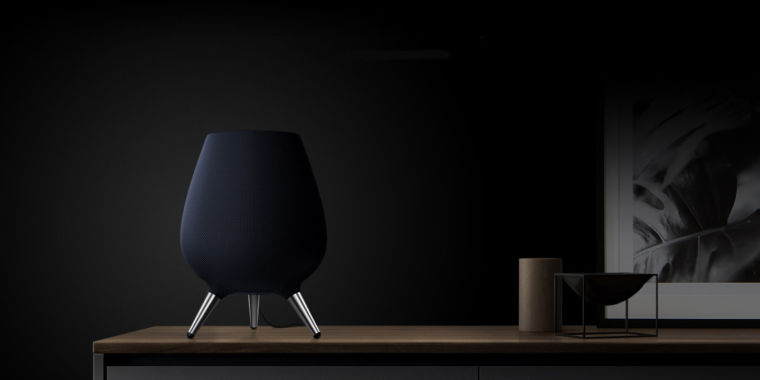Samsung’s Bixby speaker, announced one year ago today, still hasn’t launched

-
The Samsung Galaxy Home is Samsung’s long-rumored Bixby smart speaker.
-
Samsung announced the device at its Galaxy Unpacked event on Thursday.YouTube/Screenshot
-
It’s tulip-shaped and has three legs.
-
There’s a set of touch controls for playback on top.YouTube/Screenshot
-
As well as a light-up AKG logo, as Samsung’s audio subsidiary tuned the sound of the device.
-
It looks like it will have a fabric coating similar to Apple’s HomePod.YouTube/Screenshot
-
Samsung is touting a SoundSteer feature that lets Bixby aim sound at where you’re located in a given room.YouTube/Screenshot
-
Here it is on a desk. It doesn’t look to be anything too large.YouTube/Screenshot
Happy one-year anniversary, I guess, to the Samsung Galaxy Home, which was announced a year ago today. The Bixby speaker was announced at the Note 9 launch in 2018, we just had the Note 10 launch in 2019, and the event came and went without a ship date or even a mention for Samsung’s smart speaker. The Galaxy Home was supposed to be Samsung’s answer to the Amazon Echo and Google Home—a smart speaker with a voice assistant inside, but the development is taking forever.
The Galaxy Home’s absence at Samsung’s latest event didn’t go unnoticed by the media. Samsung confirmed to The Verge the device isn’t cancelled, saying, “We’re continuing to refine and enhance the Galaxy Home prior to launch, and look forward to sharing more with Galaxy fans soon.”
Samsung’s whole assistant push with Bixby always seemed questionable, as it puts Samsung in the position of having to be an ecosystem creator, something it has not typically done. Assistants need to be on a wide range of hardware form factors and integrate with a software ecosystem. The Google Assistant connects to a huge range of Google apps and services and has the backing of Google Search, while Apple’s Siri connects to iCloud and syncs across Macs, iPhones, iPads, Apple Watches, and Apple TVs. Amazon doesn’t quite have the wide range of services that the operating system vendors have, but there are still things like Prime Video, Amazon Music, and more. And Amazon was first to market, which has given it a sizable “Skill” app store, a lead on hardware, and integration with third-party devices.
Samsung is just a hardware vendor, so there’s not much justification for it to try to build its own assistant platform. Sure, it can build Bixby into a range of hardware like phones, watches, and TVs, but what software and services ecosystem is Bixby supposed to connect to? Bixby on the Galaxy Note focused on controlling the Note itself and integrating with some third-party services. Even on phones, where Bixby has the best chance of distribution, those devices are all Google Play Android phones, and thus all ship with the Google Assistant included. Every Bixby phone is also a Google Assistant phone, and users that are dissatisfied with Bixby’s capabilities can quickly, easily check out the competition.
You can get away with a subpar voice experience on smartphones, watches, and TVs because on those products, voice is a secondary function. On a smart speaker, though, voice is the only function, and Bixby needs to actually be good for the Samsung Galaxy Home to not be a laughingstock.
Listing image by Samsung
https://arstechnica.com/?p=1548699